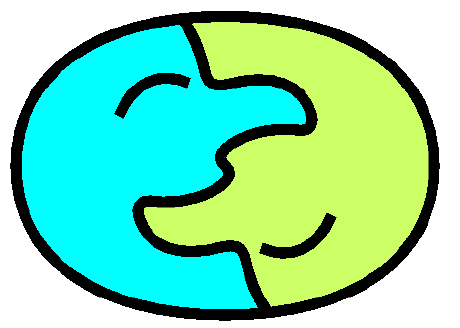Teams in Table Tennis
...Round Robin Play + Team Scoring = Winning Together...
Everyone loves to play on a team.
An old
Proposal for a
Ratings-based League
- You play for each other,
- help each other,
- and feel proud of each other.
- Teams are a great idea.
Done wrong, team-play systems for local table-tennis leagues can be inconvenient and unbalanced.
- A missing player breaks up the play sequence.
- Drop-in players are excluded.
- Team members don't get to play with each other.
- Outcomes are too predictable, so team balance becomes a huge
problem.
- Ratings are such a strong predictor of outcomes that when players are 100 points apart in rating, upsets are about 1 in 8 (12.5%).
- Even with near-perfect balance among teams, most pair-wise matches, and therefore the team results, are known in advance:
- Boring!
To get a Team Score, simply add up the rating changes of all the players on the team.That's all there is to it!
- A team with members that won is a team that improved their ratings that day, and they deserve to win!
- And a team with members whose ratings fell will lose. That's justice.
- Now you can root for each other: when you win, they win, and when they win, you win!
- Help each other out, be interested in each other's skills, play for something bigger than yourself.
- Everyone will improve, and some team will win a trophy.
Why it's not bad:
- No change to the round-robin organization.
- No problem if drop-in players show up; they can play in the round robin and simply don't get counted in any team's results.
- No problem if a team member is missing. Their rating change is zero, so it neither hurts nor helps their team. You can't win by not being there, but you won't lose either.
- No balance problems:
- Players still play within their level on a round-robin table.
- Team members can even play each other; rating changes cancel.
- Results are much harder to predict.
Why it's good:
- All teams are automatically balanced. Everyone is equal in this system. Anyone, expert or beginner, can improve or deteriorate.
- Teammates win by helping each other get better.
- Good players will talk to new players much more, and take an interest in them and their skills, instead of just talking to similar-level players on their same table.
- Teams can win by helping each other to improve, especially rapidly-improving beginners. Promising new recruits are the biggest potential asset to a team, if you can get them to join, play a lot, and improve.
- Parents can even be on the same team as their kids -- and kids will probably contribute more to the team's success! Perfect!
- The size of an upset is automatically incorporated into the scoring. An upset between players 200 points apart is a huge event, and should count more than an upset between players 10 points apart. Ratings take care of that.
Proposal for a
Ratings-based League
- Schedule: a season of 10 weeks.
- Cost:
- $40 for members, $60 for non-members, which includes gym fee.
- This is the normal gym fee plus ?$10? per player.
- Paid in advance for easy bookkeeping and to motivate regular attendance!
- Team selection:
- pick your own teams of up to 5 players each;
- any unassigned players will be assigned so as to maximize skill variation within teams.
- Format: weekly round-robin drop-in tournament.
- Non-team-members can also play, paying the regular gym fee.
- Cumulative rating changes is the team score for the tournament.
- Players actually present are sorted by rating and put into groups.
- A player who won a group the last week will be moved up a group.
- A player who lost a group the last week will be moved down a group.
- Play matches round-robin, all possible pairs, within each group.
- Match is 3 out of 5 games to 11 points.
- If time is tight, do 2 out of 3 games to 11 points.
- Record and enter your results.
- Organizer will:
- calculate rating changes for each player and each match.
- sum up rating changes for team's members, that's the team score.
- Team scores for the week and season are posted the next week
- Ratings: Initial player ratings will be the organizer's best guess, incorporating USATT and/or other available ratings. Initial rating guesses will be made on the high side if the data doesn't justify precision. A meaningfully stable current rating should be possible by using the last 10 or so matches with league participants (e.g., 2 or 3 round-robin days, possibly at other clubs).
- Awards: at the end of the season.
